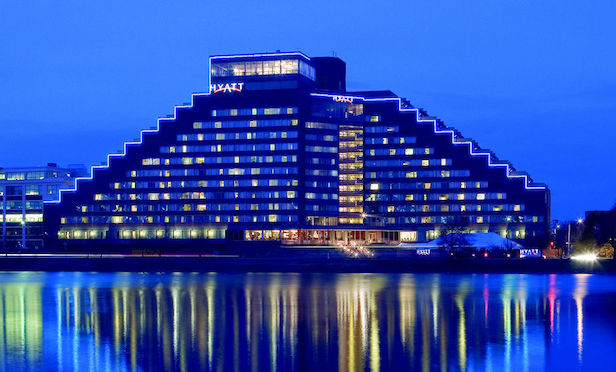
NEW YORK CITY—More consolidation within the lodging sector is on the horizon, Fitch Ratings said Tuesday. The ratings agency cited the growing power of the largest US hotel brands, namely Hilton Worldwide and the post-merger Marriott International, which is putting competitive pressure on smaller operators to add scale and brand diversity.
Fitch says Marriott and Hilton are “well ahead of their peers” in terms of system size and ADR, and are taking development share away from smaller brand operators in the US. Furthermore, says Fitch, scale-related competitive advantages—including lower purchasing and rooms distribution costs and larger customer loyalty rewards programs—attract owners and franchisees.
“To compete effectively, smaller competitors such as Accor, InterContinental and Wyndham will need to boost system growth by adding more rooms across the price spectrum,” according to Fitch. “However, these second-tier operators will be focused on greater exposure to the luxury and upper upscale segments that Marriott and Hilton dominate.”
The higher ADR enjoyed by Hyatt Hotels Corp. makes it “a logical acquisition target for second-tier operators looking to close the system size gap with industry leader Marriott while also gaining a bigger foothold in luxury and upper upscale market segments,” Fitch says. That may be even more the case with Hyatt's announcement Tuesday that it had acquired
wellness travel brand Exhale for an undisclosed sum. Earlier this year, Hyatt acquired another wellness brand, Miraval Group, for $375 million.
“However, Hyatt's dual class structure could impede M&A, absent the approval of the Pritzker family, which is the controlling shareholder,” according to Fitch. “Therefore, Hyatt is unlikely to be taken until the Pritzker family determines the competitive landscape has changed to a point where the company's smaller size becomes an insurmountable competitive disadvantage.” Fitch's report also cites LaQuinta as “an attractive property for operators seeking greater limited service exposure.”
Meanwhile, Fitch says, “smaller operators are flexing their balance sheets to support more rapid system growth and brand diversity. This could weaken credit quality if smaller lodging C-Corp issuers materially increase leverage and/or the income contribution from volatile owned and leased assets. Relying on performance and loan guarantees to support systems growth could also weaken issuer liquidity profiles.”

Fitch says Marriott and Hilton are “well ahead of their peers” in terms of system size and ADR, and are taking development share away from smaller brand operators in the US. Furthermore, says Fitch, scale-related competitive advantages—including lower purchasing and rooms distribution costs and larger customer loyalty rewards programs—attract owners and franchisees.
“To compete effectively, smaller competitors such as Accor, InterContinental and Wyndham will need to boost system growth by adding more rooms across the price spectrum,” according to Fitch. “However, these second-tier operators will be focused on greater exposure to the luxury and upper upscale segments that Marriott and Hilton dominate.”
The higher ADR enjoyed by
wellness travel brand Exhale for an undisclosed sum. Earlier this year, Hyatt acquired another wellness brand, Miraval Group, for $375 million.
“However, Hyatt's dual class structure could impede M&A, absent the approval of the Pritzker family, which is the controlling shareholder,” according to Fitch. “Therefore, Hyatt is unlikely to be taken until the Pritzker family determines the competitive landscape has changed to a point where the company's smaller size becomes an insurmountable competitive disadvantage.” Fitch's report also cites LaQuinta as “an attractive property for operators seeking greater limited service exposure.”
Meanwhile, Fitch says, “smaller operators are flexing their balance sheets to support more rapid system growth and brand diversity. This could weaken credit quality if smaller lodging C-Corp issuers materially increase leverage and/or the income contribution from volatile owned and leased assets. Relying on performance and loan guarantees to support systems growth could also weaken issuer liquidity profiles.”
Want to continue reading?
Become a Free ALM Digital Reader.
Once you are an ALM Digital Member, you’ll receive:
- Breaking commercial real estate news and analysis, on-site and via our newsletters and custom alerts
- Educational webcasts, white papers, and ebooks from industry thought leaders
- Critical coverage of the property casualty insurance and financial advisory markets on our other ALM sites, PropertyCasualty360 and ThinkAdvisor
Already have an account? Sign In Now
*May exclude premium content© 2025 ALM Global, LLC, All Rights Reserved. Request academic re-use from www.copyright.com. All other uses, submit a request to [email protected]. For more information visit Asset & Logo Licensing.








